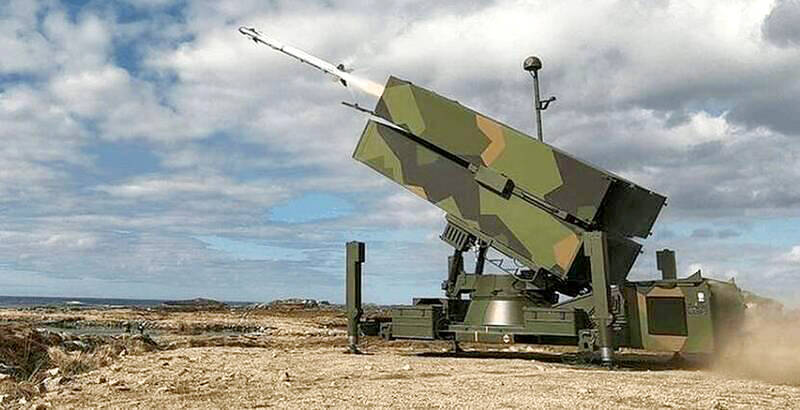The US military has strongly suggested that Taiwan prioritize the purchase of anti-air and anti-surface missiles over the procurement of Airborne Early Warning and Control and helicopter platforms, a source in the military said yesterday.
The US said the nation should increase its procurement of Patriot missile systems from the US to develop its asymmetric capabilities, the source said, adding that the US also said it is willing to provide newer models of the systems.
Washington said that Taipei should increase its purchases of uncrewed aerial vehicles and uncrewed ship drones, they said.

Photo courtesy of the Norwegian Ministry of Defense
The military has factored in the US’ suggestions into its special budget fund draft to be proposed in August, the source said.
The special budget, estimated to be between NT$300 billion and NT$500 billion (US$10.28 billion and US$17.14 billion), is still being discussed, with room for adjustment as the military continues its talks with the US, they added.
The funds would also include possible upgrades to the military’s command and control systems to the Link-22 standard, which would enable Taiwan to be integrated into the US’ communication networks, they said.
To date, Taiwan has purchased three sets of the National Advanced Surface-to-Air Missile System (NASAMS), with the first set expected to be delivered this year.
The US also said that Taiwan should increase its purchases of NASAMS, the source said.
Separately, a source yesterday said that five missile launcher trucks and a radar truck for the RGM-84L-4 Block II (U) Harpoon missiles from the US have been delivered.
The US adopted a three-stage delivery model for the Harpoon missile systems, delivering training simulators and dispatch trainers and technical instructors to Taiwan for the first stage, the source said.
The second stage would involve the delivery of launching and radar trucks, the source said, adding that the missiles would be delivered in the final stage.
Taiwan purchased a total of 100 sets and 400 missiles from the US in 2023.
The 32 sets would arrive by the end of next year, while the remaining 68 sets scheduled to be delivered by the end of 2028 are still on schedule, the source said.
The staggered multi-stage delivery would allow the military to familiarize itself with the system and be combat-ready when they receive the platform, they said.
The missiles are likely to be delivered before the end of this year, as the military had requested delivery before the official establishment of the Littoral Combat Command in January next year, they added.

MISINFORMATION: The generated content tends to adopt China’s official stance, such as ‘Taiwan is currently governed by the Chinese central government,’ the NSB said Five China-developed artificial intelligence (AI) language models exhibit cybersecurity risks and content biases, an inspection conducted by the National Security Bureau (NSB) showed. The five AI tools are: DeepSeek, Doubao (豆包), Yiyan (文心一言), Tongyi (通義千問) and Yuanbao (騰訊元寶), the bureau said, advising people to remain vigilant to protect personal data privacy and corporate business secrets. The NSB said it, in accordance with the National Intelligence Services Act (國家情報工作法), has reviewed international cybersecurity reports and intelligence, and coordinated with the Ministry of Justice Investigation Bureau and the National Police Agency’s Criminal Investigation Bureau to conduct an inspection of China-made AI language

BOOST IN CONFIDENCE: The sale sends a clear message of support for Taiwan and dispels rumors that US President Donald Trump ‘sold out’ the nation, an expert said The US government on Thursday announced a possible sale to Taiwan of fighter jet parts, which was estimated to cost about US$330 million, in a move that an expert said “sends a clear message of support for Taiwan” amid fears that Washington might be wavering in its attitude toward Taipei. It was the first announcement of an arms sale to Taiwan since US President Donald Trump returned to the White House earlier this year. The proposed package includes non-standard components, spare and repair parts, consumables and accessories, as well repair and return support for the F-16, C-130 and Indigenous Defense Fighter aircraft,

CHECKING BOUNDARIES: China wants to disrupt solidarity among democracies and test their red lines, but it is instead pushing nations to become more united, an expert said The US Department of State on Friday expressed deep concern over a Chinese public security agency’s investigation into Legislator Puma Shen (沈伯洋) for “secession.” “China’s actions threaten free speech and erode norms that have underpinned the cross-strait ‘status quo’ for decades,” a US Department of State spokesperson said. The Chongqing Municipal Public Security Bureau late last month listed Shen as “wanted” and launched an investigation into alleged “secession-related” criminal activities, including his founding of the Kuma Academy, a civil defense organization that prepares people for an invasion by China. The spokesperson said that the US was “deeply concerned” about the bureau investigating Shen

LIMITS: While China increases military pressure on Taiwan and expands its use of cognitive warfare, it is unwilling to target tech supply chains, the report said US and Taiwan military officials have warned that the Chinese People’s Liberation Army (PLA) could implement a blockade within “a matter of hours” and need only “minimal conversion time” prior to an attack on Taiwan, a report released on Tuesday by the US Senate’s China Economic and Security Review Commission said. “While there is no indication that China is planning an imminent attack, the United States and its allies and partners can no longer assume that a Taiwan contingency is a distant possibility for which they would have ample time to prepare,” it said. The commission made the comments in its annual